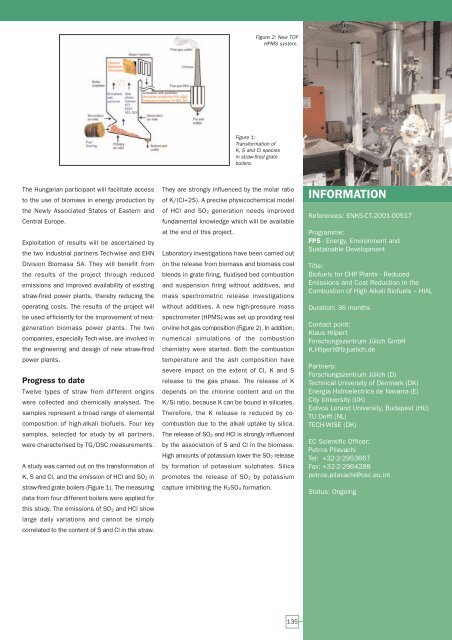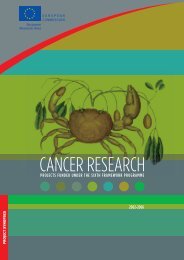European Bio-Energy Projects
European Bio-Energy Projects
European Bio-Energy Projects
Create successful ePaper yourself
Turn your PDF publications into a flip-book with our unique Google optimized e-Paper software.
The Hungarian participant will facilitate access<br />
to the use of biomass in energy production by<br />
the Newly Associated States of Eastern and<br />
Central Europe.<br />
Exploitation of results will be ascertained by<br />
the two industrial partners Tech-wise and EHN<br />
Division <strong>Bio</strong>masa SA. They will benefit from<br />
the results of the project through reduced<br />
emissions and improved availability of existing<br />
straw-fired power plants, thereby reducing the<br />
operating costs. The results of the project will<br />
be used efficiently for the improvement of nextgeneration<br />
biomass power plants. The two<br />
companies, especially Tech-wise, are involved in<br />
the engineering and design of new straw-fired<br />
power plants.<br />
Progress to date<br />
Twelve types of straw from different origins<br />
were collected and chemically analysed. The<br />
samples represent a broad range of elemental<br />
composition of high-alkali biofuels. Four key<br />
samples, selected for study by all partners,<br />
were characterised by TG/DSC measurements.<br />
A study was carried out on the transformation of<br />
K, S and Cl, and the emission of HCl and SO2 in<br />
straw-fired grate boilers (Figure 1). The measuring<br />
data from four different boilers were applied for<br />
this study. The emissions of SO2 and HCl show<br />
large daily variations and cannot be simply<br />
correlated to the content of S and Cl in the straw.<br />
Figure 2: New TOF<br />
HPMS system.<br />
Figure 1:<br />
Transformation of<br />
K, S and Cl species<br />
in straw-fired grate<br />
boilers.<br />
They are strongly influenced by the molar ratio<br />
of K/(Cl+2S). A precise physicochemical model<br />
of HCl and SO2 generation needs improved<br />
fundamental knowledge which will be available<br />
at the end of this project.<br />
Laboratory investigations have been carried out<br />
on the release from biomass and biomass coal<br />
blends in grate firing, fluidised bed combustion<br />
and suspension firing without additives, and<br />
mass spectrometric release investigations<br />
without additives. A new high-pressure mass<br />
spectrometer (HPMS) was set up providing real<br />
on-line hot gas composition (Figure 2). In addition,<br />
numerical simulations of the combustion<br />
chemistry were started. Both the combustion<br />
temperature and the ash composition have<br />
severe impact on the extent of Cl, K and S<br />
release to the gas phase. The release of K<br />
depends on the chlorine content and on the<br />
K/Si ratio, because K can be bound in silicates.<br />
Therefore, the K release is reduced by cocombustion<br />
due to the alkali uptake by silica.<br />
The release of SO2 and HCl is strongly influenced<br />
by the association of S and Cl in the biomass.<br />
High amounts of potassium lower the SO2 release<br />
by formation of potassium sulphates. Silica<br />
promotes the release of SO2 by potassium<br />
capture inhibiting the K2SO4 formation.<br />
135<br />
INFORMATION<br />
References: ENK5-CT-2001-00517<br />
Programme:<br />
FP5 - <strong>Energy</strong>, Environment and<br />
Sustainable Development<br />
Title:<br />
<strong>Bio</strong>fuels for CHP Plants - Reduced<br />
Emissions and Cost Reduction in the<br />
Combustion of High Alkali <strong>Bio</strong>fuels – HIAL<br />
Duration: 36 months<br />
Contact point:<br />
Klaus Hilpert<br />
Forschungszentrum Jülich GmbH<br />
K.Hilpert@fz-juelich.de<br />
Partners:<br />
Forschungszentrum Jülich (D)<br />
Technical University of Denmark (DK)<br />
Energia Hidroelectrica de Navarra (E)<br />
City University (UK)<br />
Eotvos Lorand University, Budapest (HU)<br />
TU Delft (NL)<br />
TECH-WISE (DK)<br />
EC Scientific Officer:<br />
Petros Pilavachi<br />
Tel: +32-2-2953667<br />
Fax: +32-2-2964288<br />
petros.pilavachi@cec.eu.int<br />
Status: Ongoing

















